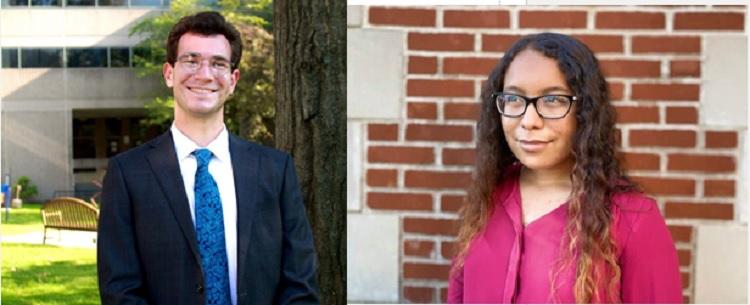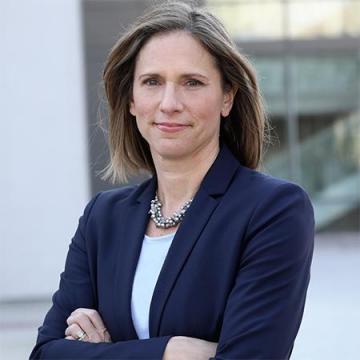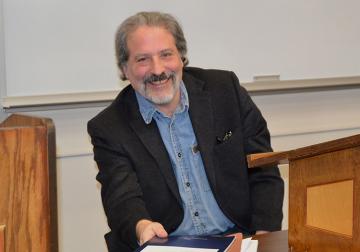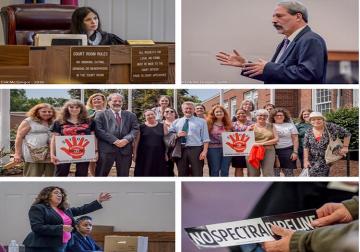Haub Law students act as NLG trained Legal Observers

On Saturday, April 3, Haub Law students Stephen Ferrante and Pamela Guerrero served as National Lawyers Guild trained Legal Observers for a demonstration and Civil Disobedience action in Yonkers. The Westchester community coalition that organized the demonstration is Fund Excluded Workers (FEW), which seeks to include two plus billion dollars in the latest NY state budget to provide unemployment compensation and other stimulus funds for families of undocumented workers and incarcerated New Yorkers.
You can learn more about Stephen and Pamela’s experience through our Q&A with them below.
Q. How did you become involved with NLG?
Stephen Ferrante: During the Black Lives Matter demonstrations of 2020, I saw Legal Observers and members of the National Lawyers Guild on the streets alongside demonstrators. I saw legal workers and lawyers involved firsthand in helping oppressed and working people in their struggle, from arrest to trial, right alongside them. I saw all of this, and enthusiastically joined the National Lawyers Guild in my first week of law school. From there, I went on to be trained as a Legal Observer in early October, 2020.
Pamela Guerrero: I became involved with the National Lawyers Guild (NLG) at the end of my first semester. I was a January admit who entered Haub Law in January 2020. Near the end of my first semester, I wanted to get more involved with campus activities and started checking out the many organizations available. The progressive mission of the NLG to use law for the people resonated the most with me, and I promptly joined the Pace chapter of the organization. I soon became the principal leader of the NLG-Pace chapter after every member of the E-board graduated, and I have since worked with NLG National and NLG-NYC to bring more legal activism opportunities to our law community. I plan to continue my involvement for the rest of my law school career and beyond.
Q. In your own words, can you briefly explain what it means to be a trained legal observer with NLG?
Stephen Ferrante: A Legal Observer is an eyewitness to a demonstration so that we can provide evidence on the behalf of the demonstrator. Our job is to arrive at a demonstration upon request, and impartially spectate the demonstration to record what is going on. We stay cordial with the police, and we make sure that the demonstrators have an account on their behalf in the event of an arrest or even if the demonstrator wants to start civil litigation. You can usually spot a National Lawyers Guild Legal Observer by the neon green hats we wear and the legal notepads we write on.
Pamela Guerrero: The National Lawyers Guild is well-known for its Legal Observer program that was established by our neighbors in New York City. It is hard to capture the entire meaning of legal observership in a few sentences, but I will try. Primarily, to be a trained legal observer is to knowingly be an ally for demonstrators and to willfully be a deterrent to unconstitutional policing. We learn in legal observer training that we are not meant to be the main focus of a demonstration rather we are there to be facilitators and protectors of the right to peaceful demonstration. Therefore, as legal observers we are normally at the front lines of demonstrations with the demonstrators but we prioritize information gathering for the sake of protecting demonstrators in litigation. What makes our service especially effective is the support network behind it. A trained legal observer can be anyone, such as a law student, a legal worker, a lawyer, and even a volunteer, that wishes to contribute to tthe defense of demonstrators. Our various members bring their own experience into legal observing making the task meaningful and very useful.
Q. You both recently participated as a trained legal observer during an April 3 event, can you speak more about that?
Stephen Ferrante: The event on April 3rd was a demonstration organized by the Fund Excluded Workers Coalition. The goal and ambition of the Coalition was to obtain unemployment funding and stimulus benefits for undocumented workers and for those who were recently released from incarceration. Members of the coalition went on a hunger strike for over 20 days, they marched on the Brooklyn Bridge, they marched to the Executive Mansion where Governor Cuomo lives, they marched in downtown Manhattan, and of course, they marched and rallied in Yonkers. On April 6th, they won, and secured $2.1 billion for excluded workers in New York State.
Pamela Guerrero: The April 3rd event was a demonstration organized to obtain unemployment and stimulus funding for excluded workers. Vital financial aid never made it to excluded workers who have worked during the pandemic. The event was part of a series of demonstrations that have continuously been held in NYC and surroundings regions. Community groups such as NYCAIC, workers unions, and coalitions organizined the demonstration. Some of the demonstrators were even on a hunger strike. The main goal of the demonstration was to capture the attention of politicians by temporarily disrupting normal activities such as the flow of traffic in Yonkers. Thus, the demonstration included the blocking of main roads around Yonkers City Hall and the placement of banners in highly visible locations for onlookers to see. The demonstrators also formed human chains to disrupt traffic, shared their stories via speech, and marched throughout downtown Yonkers. Their slogans "our labor saved lives," "who feeds us while we feed you," and "yes we can" was their unifying call to action.
Q. To you, what is the importance of the role you played at the April 3 event and/or as a trained legal observer generally?
Stephen Ferrante: Legal Observers are fairly important to a demonstration, especially when there are plans for civil disobedience. Of course, the most important people at any demonstration are the demonstrators themselves. The Legal Observers are important because we help with the first step in making sure that the demonstrators are given their due process. We collect the evidence that might eventually support them in the event of an arrest, and the incoming desk appearance ticket, hearing, or trial. Everybody has their roles to play in a demonstration, and in a movement as a whole. Legal Observers are just one small piece of that.
Pamela Guerrero: The most important aspect of my role on that day was that my very presence may have comforted some of the demonstrators and deterred greater police pushback. The demonstration was not geared toward people like me and participating as a legal observer was the best aid I could give to a group of people that can speak for themselves. The greatest reward of being a trained legal observer is the ability to get out there and help marginalized people without taking away their platform or voice.
Professor David Dorfman notes that, Pamela and Stephen performed brilliantly as Legal Observers. Professor David Dorfman was retained as the lawyer for the FEW group, to advise them as well as represent anyone who was ultimately arrested and charged. He notes that one demonstrator was arrested and received a desk appearance ticket as a result of the April 3 demonstration.
More information on the National Lawyers Guild and our Legal Observer Program can be found at: https://www.nlg.org/legalobservers/
For information on the FEW Coalition and their recent victory you can read on their website: https://fundexcludedworkers.org/



